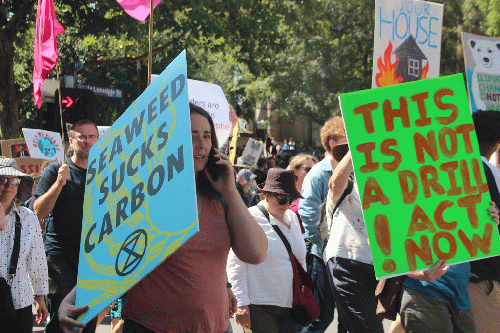From New Yorker
About a year ago, the editor of The New Yorker, David Remnick, called to ask if I thought it might make sense to publish an anthology of the reporting on climate change that has appeared in the magazine's pages. Since he works at a breakneck pace, that volume appears in print this week, under the title "The Fragile Earth." It's a wonderful book, demonstrating not only the depth of The New Yorker's commitment to this planet but also the ever-growing sophistication with which writers have taken on this most important of topics. The dark splendor of Elizabeth Kolbert's pieces alone is worth the 30 dollars.
The book opens with a piece of mine called "The End of Nature," an excerpt from a book of the same title that appeared in 1989. It's been a while since I read the words I wrote as a 28-year-old, and it made me nostalgic to climb back inside that young and perhaps overly earnest mind. The essay is a combination of reflection on the sadness of living in a world where the human imprint could be measured in every cubic meter of the atmosphere, and of straightforward reporting about what we then knew about climatic disruption. In the late nineteen-eighties, I could fit every scientific report on global warming on my desk. The articles and monographs published since then would fill an airplane hangar, but what's amazing is how little has changed. Even then, we knew that the rivers of the West would be drying up, the oceans starting to rise dramatically, the ice at the top and bottom of the planet beginning a catastrophic melt.
But we even understood many of the details. Here is a small dry paragraph that I had forgotten I'd written:
"One common suggestion is to replace much of the coal and oil we burn with methane, since it produces considerably less carbon dioxide. But ... any methane that escapes unburned into the atmosphere traps solar radiation 20 times as efficiently as carbon dioxide does. And methane does leak -- from wells, from pipelines, from appliances; some estimates suggest that as much as three percent of the natural gas tapped in this country escapes unburned."
We knew that, but we wasted much of the past 30 years wandering down that blind alley anyway. (Indeed, new estimates show that methane is 80 times more potent than carbon dioxide.) The Obama Administration's response to climate change was mostly about replacing coal with natural gas.
That's why it was very good news last week when Joe Biden's transition team announced that he would not employ anyone who had helped to lead fossil-fuel companies. Assuming that the promise carries over to an Administration proper, it means that natural-gas advocates (and Obama holdovers) such as Ernest Moniz or Heather Zichal, both of whom have served lucrative terms on the boards of large fossil-fuel firms, will find themselves sidelined in the event of a Biden Presidency. That's crucial, because we need people fully committed to the task of building out solar and wind power as fast as possible. Those technologies are much cheaper now than they were 30 years ago, which helps change the game. (Indeed, news came last week that ExxonMobil, not long ago the most valuable corporation in the world, now had a market cap smaller than a big solar-and-wind company.) As the credit-rating agency Moody's pointed out in an analysis released last week, natural-gas pipelines are now an unwise financial bet, partly because activists have become adept at blocking them. The pincers created by the confluence of cheap clean tech and a stronger environmental movement should give Biden the opportunity to move far more nimbly than any President before him. That's, of course, if he's elected, which remains the first order of business.
Passing the micVoting season has begun in earnest, and so here are short interviews with two women running for the Senate. (I've had to condense both interviews for space.) The first, Lisa Savage, is the independent Green candidate in Maine. It is a really bad idea to vote for Green candidates in most races in this country, especially (as Ralph Nader and Jill Stein showed) in a Presidential contest. But Maine is the exception: voters there get to rank their votes, meaning that, if they'd like to, they can support Savage confident that, if she's at the bottom of the tally, their ballot will then pass to the Democrat Sara Gideon, who seems to have an excellent shot at beating the Republican incumbent, Susan Collins.
(Note: You can view every article as one long page if you sign up as an Advocate Member, or higher).






